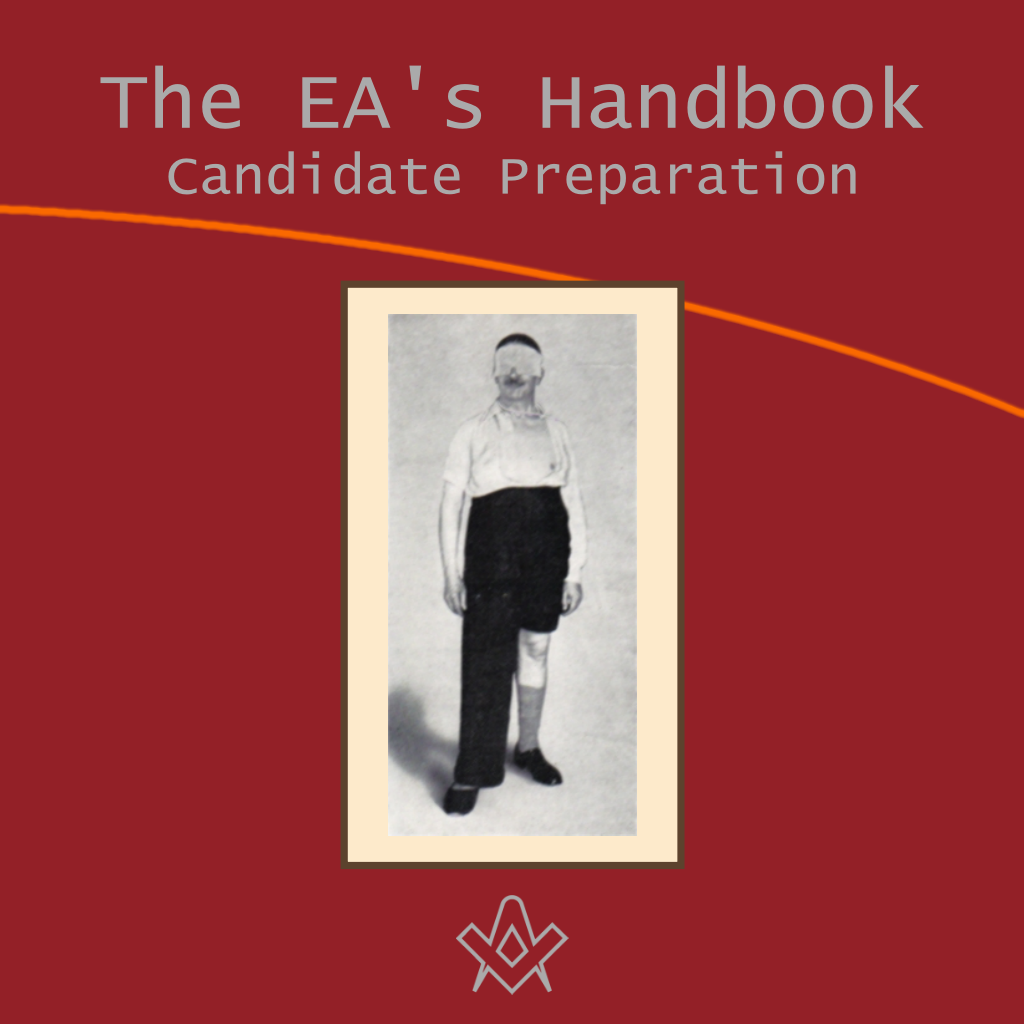The next thing that happens is that the Candidate is prepared by the Tyler. This is a very important matter.
There seems little doubt that originally candidates were striped naked, and even to-day in the U.S.A. Candidates are left in their shorts only.
In Burma we changed out of everything into a one-piece pyjama suit, a most convenient arrangement.
CHAPTER III – Candidate Preparation
What we now have is a system by which the parts which have to be bare are made bare. We take our obligation on our left knee, therefore that knee must be bare Why?
So that our flesh may be in contact with Mother Earth. It is possible that there was a practical as well as a symbolical meaning in this , and also in the case of our deprivation of monies or metallic substances.
In some of the ancient mysteries it has been suggested that a charge of electricity was passed through the Candidate as he knelt at the altar, either from a battery, or by what is now called magnetism.
If any question the use of electricity in those days, I would point out that certain statements of Herodotus, to the effect that the Egyptian priests brought down lightning by means of rods, can best be explained by admitting that they had some rudimentary knowledge of electricity. The bare breast is in order that the sharp instrument can be applied.
The Scotch ritual, however, says it is to show your genda, but I am inclined to think this is a modern gloss. Personally, I should not regard this as conclusive proof in itself, for I have seen (when abroad) many well grown girls who had no breasts worth mentioning, while many native men had quite well-developed busts.
It should always be remembered that this is the degree of birth and we were born naked.. We are slip shod because we are about to tread on holy ground, just as in the East we wear slippers when entering a mosque.
It is probable that the Scotch ritual has preserved a real tradition when it refers to the custom in Israel of removing a shoe, as a witness, when confirming an obligation.
Those interested will find the details in Ruth, where Boaz undertakes to marry Ruth. A cable tow is placed about his neck. This piece of symbolism is old and world wide.
On a vase found at Chama, in Mexico, several candidates are depicted going through a ceremony very similar, apparently, to a certain degree in masonry. [1]
One is being taught a certain sign, and the others stand waiting their turn all have cable tows with a running noose about their necks.
![]()
In India this cable tow is the emblem of Yama
In India this cable tow is the emblem of Yama, the God of Death, with which he snares the souls of men and drags them forth from their bodies. It is carried by – Shiva to indicate his destructive character in relation to human life.
There are in masonry meanings within meanings, and I will therefore indicate a few of those associated with the cable tow, but I shall not do so with all the details upon which I shall touch. The cable tow is an emblem of Death.
It is fastened round the necks of captives as showing that they are at the absolute mercy of their conqueror.
Thus the burgesses of Calais had to come before Edward III in their shirts-note that-with cable tow’s round their necks.
They were only saved by the desperate pleading of good Queen Philippa. But this is the degree of birth.
Some come into the world with a caul which may strangle them if not removed, and in any case we are said to be born in original sin and therefore doomed to die.
The holding of the cable tow and the dangers entailed, are sufficiently explained to need no further mention just now, though this does not imply there are not inner meanings.
The hoodwink is always found in every great initiatory rite. In general, it reminds us that as in the physical world we came out of darkness into light, so in the intellectual, and finally, in the spiritual world.
![]()
the first thing we see there is the Volume of the Sacred Law, itself a symbol of Divine inspiration
We come into masonry seeking the Light of God’s word. In other language, to try and comprehend through the use of symbols what God really is.
But as the veil of darkness is slightly lifted as we grow in years and our intellect awakens , so it is in the craft, and the first thing we see there is the Volume of the Sacred Law, itself a symbol of Divine inspiration; for without the Divine spark, which speaks from the inmost recesses of the soul, we shall remain in spiritual darkness all our natural life.
The Candidate is then brought to the door of the Lodge and challenged, but strange to say, in our ritual there is no password.
There was once, I have no doubt, and it is still in use in Scotland, Ireland and U.S.A. Moreover, it is one of the tests there when visiting, and if a man cannot give it he will run a serious risk of being refused admission.
Strange to say, we do get it inside the Lodge, though perhaps most brethren do not realise it.
It is “The tongue of good report” (sometimes it is “Free and of good report.,” though this is less usual). But before entering we are deprived of money and metallic substances.
Now, among the Dervishes [Dervish or Darvesh or Darwīsh in Islam can refer broadly to members of a Sufi fraternity, or more narrowly to a religious mendicant, who chose or accepted material poverty.] money = mineral substances, but we interpret it money.
It is Metals!-that is important. “Valuables” is a real, but subsidiary, meaning. Let us consider this carefully.
There is an explanation of why it is done in the lecture,-now, alas, seldom read in Lodge-and also, of course, in the questions.
![]()
at the building of the Temple no metallic implements were used
These lectures were the real instruction; on them were based the tracing board lectures, which were pictorial summaries, on which were set certain questions.
Now the lectures (which can be bought at any Masonic furnishers) tell us that at the building of the Temple no metallic implements were used. Why? Because metals came from below.
They were the gifts of the Thonic Gods:-the Gods of the Underworld-useful, no doubt, but being gifts of the Gods of the Underworld they were in their very nature evil, and abhorrent to the Gods of Light, whom the white races worshipped.
For this reason the Egyptians continued to use stone knives to open the corpse preparatory to embalming it, long after they used metal knives constantly. The holy dead must not be polluted with the gifts of the evil powers.
If there is anything in the theory of an electric or magnetic discharge being made at the time when a metal point is applied to the naked left breast at the obligation, this would also be a practical reason; the presence of metal might make such a charge dangerous.
But the first reason is no doubt the original one, and probably the only one. The idea that we bring nothing into this world is, of course, likewise obvious; but its full significance is lost in our ritual, although seen in the Irish.
There a Candidate is deprived of metals in the first and in the second degrees.
The significance of this will be realised by Master Mason’s if they ponder awhile on the meaning of the Senior Warden’s password – “How hardly shall a rich man enter the kingdom of Heaven.” That worldly possessions hamper a man’s spiritual progress is proclaimed by every religion in the world which can truly be called great.
a ceremony which, in the technical language of magic and the occult
The Buddhist monk and the mediaeval friar alike agree on this. Why passwords. at all? Here we wander into a strange field, no less than that of old world magic, I think.
The Candidate enters an Entered Apprentice Lodge from the outside world. Prior to his entry this Lodge has been opened by a peculiar ceremony :- a ceremony which, in the technical language of magic and the occult, raises the vibrations of those present; thus they are , as it were , raised to a higher key, and force is generated.
Now those who have studied such matters know that a body of men who are all concentrating on a particular subject do generate a peculiar, subtle, but powerful force, which has not been accurately defined by science , but is loosely called magnetic.
In the old days of phenomenal magic certain words, when uttered in the correct tone, were believed to be in consonance with this “power,” like a tuning fork is to a violin.
Therefore we give this password to the Candidate to raise him quickly to the same “power” as the Lodge.
But I am afraid I may be getting rather deep for our younger readers.
All I need say further is that such passwords are universal in the great mystery rites, ancient or modern, and it is not surprising, therefore, that in some rituals we find a password leading to the 1 degree.
Footnote [1] See “Freemasonry and the Gods” Birth, in the very nature of things, means death, and that is why the Hindoos have made Shiva, the Lord of Death, also the Lord of Birth.
We ourselves are captives- souls bound by the chains of the flesh-and offenders against the Law of the King of Kings. Further, we come in bondage to sin, seeking to be freed from our bonds by the word of God.
Article by: J. S. M. Ward
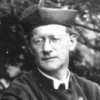
John Sebastian Marlow Ward (22 December 1885 – 1949) was an English author who published widely on the subject of Freemasonry and esotericism.
He was born in what is now Belize. In 1908 he graduated from the University of Cambridge with honours in history, following in the footsteps of his father, Herbert Ward who had also studied in history before entering the priesthood in the Anglican Church, as his father had done before him.
John Ward became a prolific and sometimes controversial writer on a wide variety of topics. He made contributions to the history of Freemasonry and other secret societies.
He was also a psychic medium or spiritualist, a prominent churchman and is still seen by some as a mystic and modern-day prophet.
Recent Articles: J.S.M Ward EAF Handbook

Book Review - The EA, FC, MM Handbooks
Essential reading for every Entered Apprentice, Fellowcraft, and Master Mason - these seminal books by J.S.M Ward are what every Mason needs!
more....
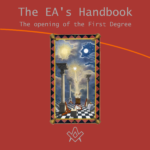 The Entered Apprentices Handbook P1 Chapter 1 - An interpretation of the first degree, the meaning of the preparation, symbolism, ritual and signs. Chapter 1, The opening of the First Degree |
 The Entered Apprentices Handbook P2 Chapter 2 - The Tyler or Outer Guard. The first thing that greets the eyes of the aspirant to our Order standing in front of the door with a drawn sword in his hand. |
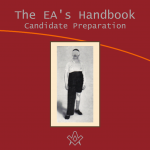 The Entered Apprentices Handbook P3 Chapter 3 - the Candidate being prepared by the Tyler. What we now have is a system by which the parts which have to be bare are made bare. |
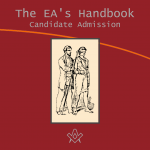 The Entered Apprentices Handbook P4 Chapter 4 - The candidate's admission into the lodge, is received on a sharp instrument. This signifies many things, one idea lying within the other. |
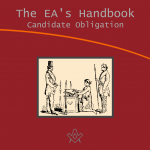 The Entered Apprentices Handbook P5 Chapter 5 - In all the ancient mysteries a candidate obligation was exacted to secure the secret teachings given in these mysteries which disclosed an inner meaning. |
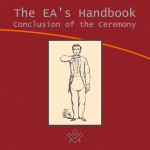 The Entered Apprentices Handbook P6 Chapter 6 - Having taken the first regular step the Candidate is given the Sign. This he is told refers to the Penalty of his Obligation, and no doubt it does, but it also seems to refer to something much more startling. |
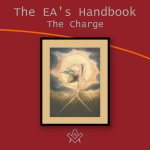 The Entered Apprentices Handbook P7 Chapter 7 - The candidate receives the charge, the first significant point is the phrase "Ancient, no doubt it is, as having subsisted from time immemorial". |
 In the second volume we are dealing with the degree of Life, in its broadest sense, just as in the first degree we were dealing with the degree of birth, and as life in reality is educational for the Soul, we are not surprised to find that throughout the whole degree the subject of education is more or less stressed. read the full series … |
 The third degree in Freemasonry is termed the Sublime Degree and the title is truly justified. Even in its exoteric aspect its simple, yet dramatic, power must leave a lasting impression on the mind of every Cand.. But its esoteric meaning contains some of the most profound spiritual instruction which it is possible to obtain to-day. read the full series … |
masonic knowledge
to be a better citizen of the world
share the square with two brothers

click image to open email app on mobile device


